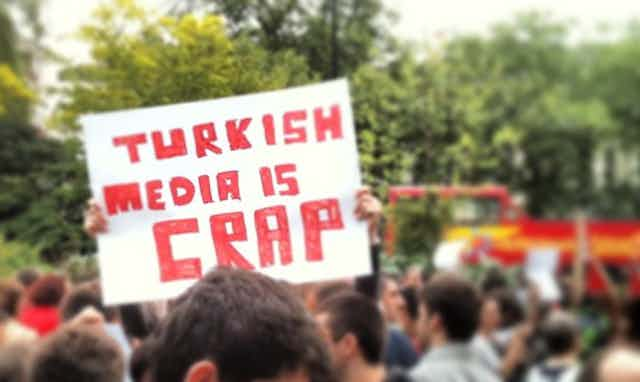As autumn comes to Turkey, the spirit of Gezi Park can still be felt in the air. After months of mass anti-government demonstrations, the only common consensus is that political climate will never being the same again.
The AKP government is ready to take harsh actions against even the slightest possibility of a protest. Gezi Park is closed as soon as there is a call for a gathering or related activity on Twitter. As the new academic year begins, police forces – rather than private security staff – will be positioned on university campuses. It seems that the government gets the chills even from graffiti on the walls of back streets. One example read: “We will be back in September, make your pepper gas ready, mate!”
While society has become even more polarized by the Gezi Park protests and even by the failed 2020 Olympics candidacy of the city of Istanbul, authorities have mastered the targeting of journalists in subtle ways. The most prominent journalists, columnists, TV personalities with critical voices have been forced to step down and been replaced by loyalist peers. This clearance of opposition has been swift, bold, and shameless. The Turkey Journalists’ Labour Union (TGS) announced that 59 journalists were sacked in apparent retaliation for their coverage of the Gezi Park protests.
Media companies have finances at stake as a result of investments in various other sectors such as construction, energy, banking, and telecommunications – so they prefer to look the other way when it comes to the issues of human rights, press freedom and professional ethics.
While a growing number of journalists are resorting to self-censorship to survive, Turkey has the humiliating title of “the world’s biggest prison for journalists” – courtesy of Reporters Without Borders. The number of imprisoned journalists in Turkey varies depending on which international press freedom associations figures you look at. But the average from the like of The International Press Institute (IPI), Committee to Protect Journalists (CPJ) and Reporters without Borders is around 50. According to the opposition Republican People’s Party (CHP), it is 64 and another 123 are facing trial on charges of terrorism.
On August 5, at least 12 journalists accused of colluding with an anti-government conspiracy known as Ergenekon were among those who received long jail terms from an Istanbul court hearing the case. Ergenekon is known as “the trial of the century” in the Turkish press. Although there are many defendants with criminal pasts, there is a growing public view that many people, including journalists have been punished because of their hard-line secularist and ultranationalist views.

Mustafa Balbay, a former reporter for the strongly secularist daily Cumhuriyet and Ankara Parliamentary representative for the opposition party CHP, was sentenced to 34 years and eight months in prison while journalist, politician and former Biz TV owner Tuncay Özkan was given an aggravated life sentence (without possibility of pardon). Balbay has been detained for the past four years, Özkan for five.
On September 11, there will be another hearing, this time for Oda TV which is an online news portal known for its fierce criticism of the government. This trial involves 12 journalists including investigative reporters Ahmet Sik and Nedim Sener. The charges against the journalists are “aiding an armed terrorist organisation”, “inciting hatred and hostility”, and “obtaining confidential state security documents.” But even though authorities claimed they had serious evidence to prove those accusations, it has so far not been presented in court. All of the defendants deny the charges against them.
Last December deputy prime minister Bülent Arinç pledged reforms that would address press freedom violations and lead to the release of imprisoned journalists. Unfortunately, the reform package had no positive impact on this issue so far.
Kurdish journalists suffer most from the Penal Code and anti-Terror laws that equate covering the activities of the illegal terrorist group PKK with terrorism itself. It seems that it is getting harder to keep balance between preventing the praising of violence and freedom of expression. On the other hand, the state officials flatly deny all allegations of lack of press freedom by calling them either a major foreign conspiracy or an unfair political move against the government. The government claims that most of the imprisoned journalists are being charged with serious crimes, such as membership of an armed terrorist organisation, that have nothing to do with journalism.
But the nation’s imprisonments surpassing many oppressive countries, like Iran and China unfortunately makes Turkey among the least hospitable nations for journalists in Europe.

